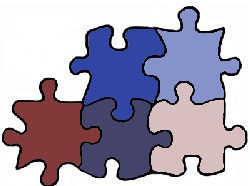|
Term
|
Definition
|
Illustration
|
| Concepts |
Mental
models or explanations,
sets
of ideas about how things work. |
Hegemony
is a concept that explains how some members of a society exercise power
through coercion and persuasion, gaining the consent of those who have
less power by persuading them to "buy into" ideas that may not benefit
the less powerful.
Hailing
is a concept that explains how readers or viewers of a text can be led
to feel that the text "speaks to them" through textual elements that directly
address their interests or perspectives. |
| Discipline |
Academic
fields
"Members"
of a discipline usually share concepts, materials, methods, frameworks,
and knowledge |
As
a discipline, English is concerned with the production and interpretation
of literary texts, including fiction, essays, drama, poetry, and film.
Literary scholars draw on a shared vocabulary about authorship, imagery,
the use of language, literary forms, and so on, as well as shared knowledge
of the history of literature, theories of literature, and familiarity with
a common body of texts.
Sociologists
draw on a shared set of ideas about how societies and individuals connect,
methods for gathering data about human behavior and ideas, methods for
analyzing qualitative and quantitative data, theories that explain human
behavior, and knowledge of key studies, processes, and theories. |
| Framework |
The
structure of knowledge, an awareness of the relationship between the elements
in a discipline

|
The
study of history, for example, is usually organized by time periods, and
historians share a common language and some common knowledge of what was
happening during each period. In addition, historians have a sense of the
various factors that shaped historical trends and events. So given a specific
document, they would immediately position it in an historical framework,
considering how it might connect with other documents from that period,
major issues of the period, and so on. An historical framework also includes
ideas about what kinds of information various types of documents offer,
so when historians look at letters, their framework includes a set of characteristics
that usually apply to letters, but they might also look closely at a specific
letter to figure out where it fits within the larger category of letters. |
| Interdisciplinary
Analysis |

Integrating
concepts, materials, and methods from multiple fields into an analysis. |
An
interdisciplinary scholar interested in work might consider what people
say work means to them, as expressed in a variety of media and art, but
he would also want to explore how work has changed over time and how it
shapes the patterns of daily life and has been shaped by patterns of technological
change. At the same time, he might want to consider analyses of how work
contributes to social stratification, the development of group affiliations,
a sense of self, and cultural values. Big questions about culture almost
always benefit from such multifaceted explorations.
Interdisciplinarity
is rarely a small-scale activity, and working with materials, methods,
and concepts from multiple fields doesn't tend to yield simple, clear answers.
Interdisciplinary questions are, almost by definition, questions that yield
complex and multiple answers. Different disciplines and approaches uncover
different aspects of a common question, and to a large extent interdisciplinarity
happens when we pay attention to how those different perspectives complement
and contradict each other. |
| Knowledge

|
The
integrated collection of concepts and information that someone understands |
Disciplinary
knowledge refers to the framework, methods, and information that members
of a discipline share. People working within a discipline can usually expect
that their peers use certain terms in the same way, that they all use common
concepts in more or less the same way, that they speak the same language
and live in the same disciplinary culture.
In
literary studies, for example, most scholars know the approximate time
periods, themes, and significant contributions of many individual writers,
as well as how literature developed and changed during major periods and
something about the characteristics of various literary movements. They
also share a vocabulary of terms, such as prosody, voice, narration, motif,
and so on. |
| Materials |
The
sources that scholars in a discipline use |
Sociologists
look at what people say and how they behave as their primary materials.
Geographers study maps and demographic data.

Historians
look at documents of all kinds. Art historians look at works of art as
well as at what was written about them. |

Method |
The
tasks and processes that scholars use to analyze data |
Literary
scholars and historians engage in close reading. Sociologists use mathematical
formulas to test the validity and significance of statistics. Anthropologists
use observation and ethnographic interviewing. |
| Questions |
Inquiry
into a subject that leads scholars to investigate materials and apply methods;
what we don't know but want to know |
Why
do some texts become popular? What do audiences do with popular texts?
How do popular narratives influence individuals and the society? Does violence
on television lead to violent behavior? |
| Understanding |
The
ability to use knowledge, to apply what you know to new situations and
problems

|
By
the end of this course, you'll demonstrate your understanding of interdisciplinary
analysis and popular narratives by applying your understanding to your
own analysis of a popular text. |





